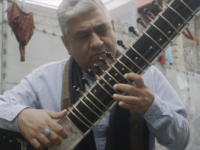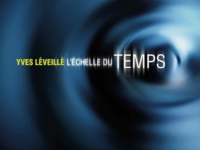Yaya Diallo is an author and musician from Mali who found fame as the author of The Healing Drum. He’s enjoyed a career as an international touring artist, while also defending of African cultures through his work with the organization Farafina Donia.
Diallo’s unique way of combining Western instruments to play African traditional music can be heard in many of his recordings, including Live at Club Soda, Fienso, Nangape and his current release, Kachi: Traditions to Traditions. The LP builds on Diallo’s work, expressing the essence of African traditional music in ground-breaking intercultural ensembles.
Centered on healing and devotional music, Kachi: Traditions to Traditions is a mix of traditional and experimental and aims to honor the past and cultures of Africa while embracing Western instruments and sounds – and it works.
“My goal is to play Minianka balafon music with traditional Western instruments—violin, cello, double-bass, flute,” Diallo explains, “as well as African percussions — djembe, talking drum, and dounou — to create a new sound that can open doors for listeners worldwide.”
Kachi specifically honors the traditional Minianka role of the coredjouga, someone who has shed everything and has no need for material possessions. Their symbol is a vulture but not as a carrion creature but one who can use what others have discarded. “That is what I have done in this new album: I have taken instruments that are old and left behind and transformed that into new energy,” Yaya Diallo says. “We should stop wasting things and recycle them.”
The music here draws from a repertoire of “lost” and “hidden” music, which is no longer played in Minianka villages. Even though these songs are not usually meant to be heard by the public, Diallo feels it is necessary as an elder to preserve them: “This music belongs to humanity. My people say that when an old African dies, it is like a library burning,” he says. “If I can share the small things I get, I can be happy. I want my grandchildren to be able to play this music.”
A wise saying in African culture states, “One cannot build the new with the old.” Kachi: Traditions to Traditions proves the saying wrong, as he combines sounds that are unique and interesting.
“Kachi Zie,” Yaya Diallo’s extraordinary opening track, features simple rhythms juxtaposed to create apparent complexities, over which the voice in chorus sings and layers. The rhythmic, repeated pattern provides steady background, and what strikes the listener is that the spaces between notes are as vital as the notes themselves. Delicate, simple melodies and harmonics are woven together carefully to create a sonic path. The strings sigh over the top in places, creating a beautiful blend of Western and African. Zie is the first child of sacred wood, so there is a sense of power in the music, as one of the messages is to treasure nature in all its forms and not cut the sacred tree.
“Tien” is string-led with rhythms similar in pattern to the preceding number, but now male and female voices in harmony, strings, and a change of percussion add to the textures and development of the music. “Bon Yi” is about a funeral. The repeated rhythms allow for reflection, and the uplift of the percussion is counteractive and almost counterintuitive. However, the joy and vivant in the music belie the loss of a dear one. It is simply a celebration, tinged with just a touch of melancholy since we have an entry in this world called birth but also an exit called death.
“Mato” is a celebration of all the great people. The music is strong, powerful, and evocative, giving strength to those undertaking strenuous or challenging tasks and achieving. In Diallo’s culture, anybody can achieve anything, and those who do will be celebrated. “Kachii” means forgiveness, accepting yourself for who you are, and being comfortable. The music is steady and rhythmic, and the strings rise in gentle, arcing tones to create a sense of peace, tinged with a touch of something – perhaps warning? They are not all sweetness and light but occasionally grate, as if to remind the listener that forgiveness is not quite as easy as we like to imagine. A lovely piece.
“Fantakolo Part 1” is what to do if you are feeling poor and out of sorts – liven up the proceedings with music. Singing, gentle swaying beats and glorious, joyful harmonics define this music. The little drum solo is also cheeky and moving. “Part 2” follows the same idea, but the music expresses it differently. The singing lifts us out of contemplation while the resounding, repeating rhythm is a reminder of continuity, touched with fast and furious variations. Same message, different groove.
“Gifono” is about finding different ways to achieve, even if we might not have the “right” tools to begin with. It uses rhythms offset against each other, which join then diverge, symbolizing different pathways arriving at the same place – eventually. In this case, the patterns to reach that place are a delight. “If a crocodile buys trousers, don’t ask what he will do with his tail,” is a Minianka saying. This music perhaps explains why you don’t ask. “Koredjouga” speaks of people can enjoy life and have contempt for no one and nothing. They can use cast-off materials to transform into goods and negativity to create joy. Similarly, the band uses old instruments and high-pitched ululating vocals to unite them with Western sounds and create something new.
“Teriya” is about friendship and the need for openness and honesty, even if that sometimes means a little disharmony in the relationship. That’s occasionally reflected here in the vocals, alongside the continuous rhythms and strings. “Hoo” is about death and passing from one life to another. The track has high-pitched wails, strained voices, and a settling, calming rhythm, and the meeting of African and Western sounds bring about new, unique, and sonically interesting harmonies.
Throughout Yaya Diallo’s Kachii: Traditions to Traditions, there are strong, repeated rhythms and harmonies – some of which link tracks and parts of tracks. So you find yourself recalling the preceding track while also taking on board new sonic additions. The music is enormously attractive, and there is a peace that pervades the music, even when the tracks tackle death and dying. An interesting listen, calming and thoughtful.
- Milena Casado – ‘Reflection of Another Self’ (2025) - May 4, 2025
- Luis Ianes and Noel Akchote – ‘Seuil’ (2025) - April 12, 2025
- David Dower Trio – ‘Sonder’ (2025) - March 23, 2025




